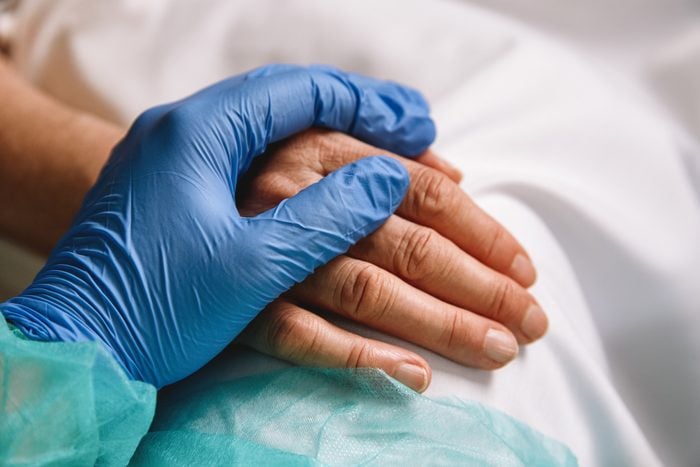
Colorectal cancer: The second leading cause of cancer deaths
Did you know that, according to the American Cancer Society, colorectal cancer is the second leading cause of cancer-related deaths in men and women combined? While many people are very aware of the top killer—lung cancer—and other common cancers like melanoma and breast cancer, a concerning number of us aren’t paying any attention to this silent killer.
The American Cancer Society predicts that about 106,970 people will be newly diagnosed and 52,550 people will die of colorectal cancer in 2023—an avoidable projection, as colon cancer is very treatable and has a survival rate of over 90% when it’s caught early, says Fola May, MD, a gastroenterologist and associate professor of medicine, David Geffen School of Medicine at UCLA and the director of Fight Colorectal Cancer.
The good news is that the incidence—the number of new cases in a given time period—has been declining about one percent year since 2011. But the bad news is that colorectal cancer is actually rising in younger adults. In people younger than 50, rates have been increasing by one percent to two percent each year since the mid-1990s, according to the ACA.
Physical inactivity and obesity are possible causes for these trends. If you have colon cancer risk factors (such as a family history), discuss with your doctor whether you should start screening before age 50. Follow these healthy lifestyle tips to prevent colon cancer, and never overlook these silent symptoms of colon cancer you might be missing.

Cut out processed meats
A diet high in red meat and processed meats—think salami, hot dogs, cured bacon, and fast food—is one of the top risk factors for colorectal cancer. “It’s okay to have these foods as an occasional treat, but you shouldn’t be eating a charcuterie spread on a regular basis,” says Dr. May.
Swap out processed meats for fresh poultry or get protein from vegetable sources like tofu (which has its own cancer-fighting properties!).
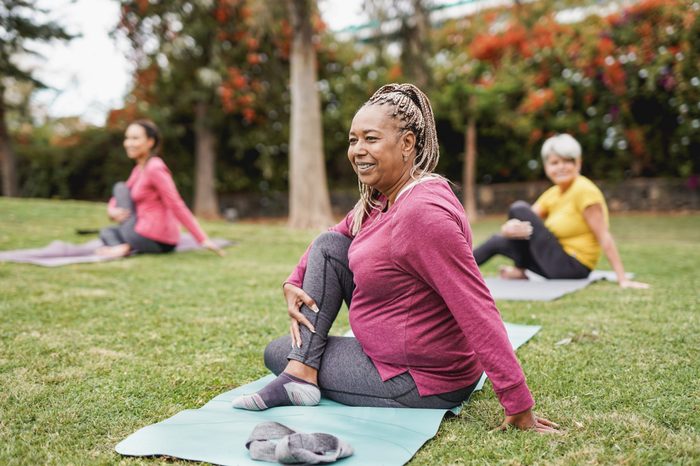
Exercise daily
Getting regular daily exercise may prevent approximately 15% of colorectal cancers, according to a 2019 meta-analysis of research studies. And, they found, in people who did develop colorectal cancer, daily exercise was linked with better treatment outcomes, a faster recovery, and less incidence of the cancer coming back.
“It doesn’t matter so much what type of exercise you do, as long as you’re moving your body every day,” says Dr. May. “I recommend getting at least 150 minutes of moderate-intensity or 75 minutes of vigorous-intensity activity each week.”
This Type of Exercise Can Reduce the Risk of Cancer Spreading, Research States

Sit less
It probably won’t surprise you to hear that sitting down for hours at a time is associated with a higher risk of back pain, heart disease, deep vein thrombosis, diabetes, and obesity. But did you know that the inactivity associated with sitting for long periods without a break is now also linked with an increased risk of a number of cancers…and that colon cancer is at the top of the list?
It’s largely because sitting for prolonged periods leads to a build-up of inflammation in the body. Canadian research suggests that chronic inflammation is a predisposing factor for developing colon cancer and a number of other cancers.
If you work at a desk, stand up and take a short walk at least every hour—around the office, down the hallway—anywhere will do.
Here’s How Much Exercise You Need to Counteract Sitting All Day, Says Study
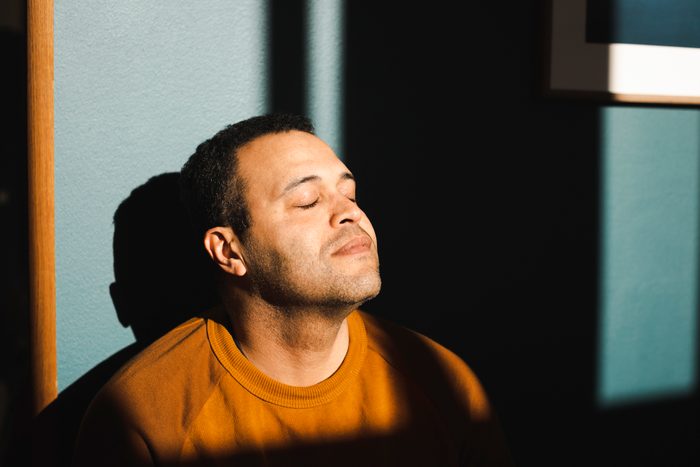
Soak up some sun
The benefits of regular (but not excessive) exposure to sunshine extend to preventing colon cancer. Of course it’s essential to avoid sunburn, but your body needs plenty of vitamin D (which is produced when the skin is exposed to the sun), to stay healthy and prevent colon and other cancers.
A 2019 study of almost 13,000 adults found that low levels of vitamin D raised colon cancer risk by 31%. You need to expose your limbs and face to sunshine on a regular basis, wearing sunblock. This exposure can last between 10 and 30 minutes, depending on your skin tone, with darker skin scientifically able to absorb the higher end of that exposure range. Taking the right vitamin D supplement for your nutritional needs, or eating oily fish and other vitamin D-rich foods, could also be beneficial.
Spending This Much Time Outside Each Day Could Make You Live Longer
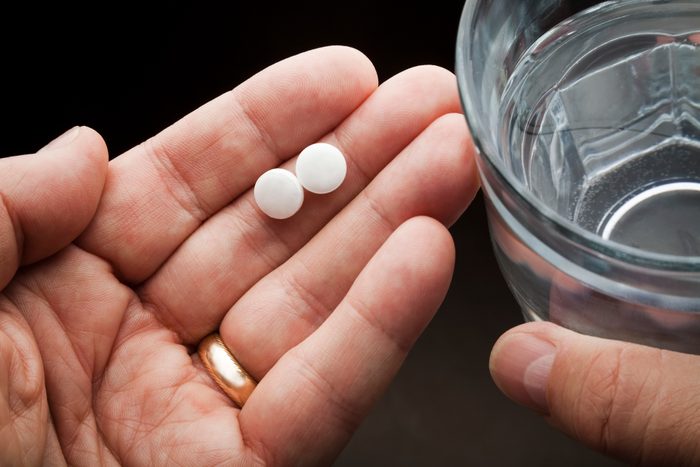
Talk with your doctor about aspirin
With growing evidence that aspirin can prevent cancer and possibly prevent it from spreading, some doctors advise that people at high risk of bowel cancer should take not just one dose per day—but two—and the earlier you start, the better, according to a 2021 study published in JAMA Oncology.
People with a genetic link to bowel cancer have 10 times the risk of developing it—and often do so at a relatively young age. One 2011 study published in the peer-reviewed medical journal, Lancet, suggested that by taking two low-dose aspirin tablets a day, they can cut their risk by more than 60%. However some research has suggested it’s only effective if they start the aspirin therapy in their sixties. By age 70 it’s no longer preventative.
Note that this is still a controversial therapy, as it risks causing a peptic ulcer or anemia from chronic minor bleeding in the digestive tract. But in some cases, doctors believe the risk is worth taking.
If bowel cancer runs in your family, speak with your doctor about this approach.
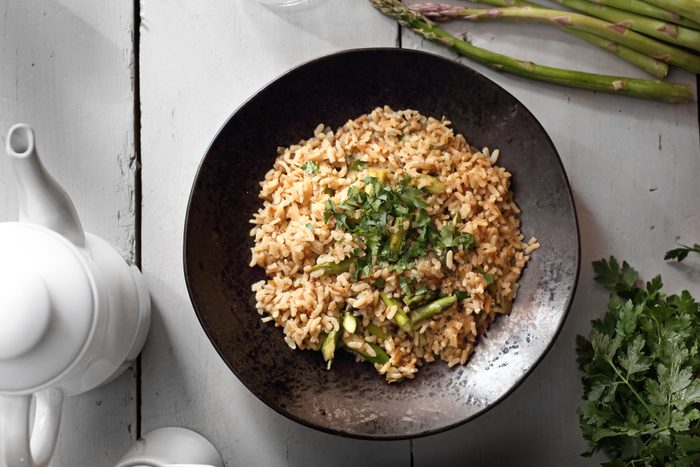
Incorporate more brown rice
The long-standing debate over whether high-fiber foods can help prevent colon cancer appears finally to have been resolved conclusively. Following a major review involving nearly two million people, in 2011 scientists concluded that eating plenty of whole grains and cereals—particularly rice and oats—does indeed show some protection against these cancers. Put brown rice and oats on the menu as often as possible as an easy way to keep your bowels healthy. (Oatmeal delivers a host of other benefits, including that it’s one of the best foods for your heart.)
10 Healthy, Tasty Oatmeal Toppings You May Have Never Thought to Try
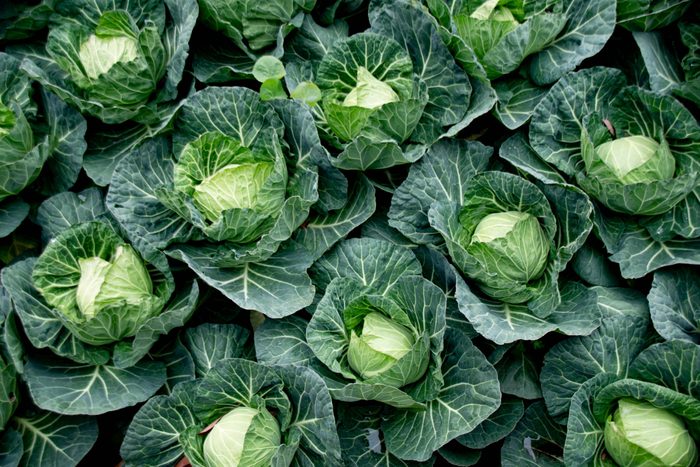
Go for cancer-beating cabbage
There’s a chemical that’s produced when some green, leafy vegetables such as cabbage are chopped, cooked, chewed, and digested. This chemical has been shown to weaken cancer cells and prevent them from multiplying. The key chemical, known as sinigrin, is converted in the body to the anticancer substance allyl-isothiocyanate.
Dr. May says all you need to know is that eating your leafy greens really will help prevent cancer, including cancers of the digestive system.
11 Benefits of Spinach That Will Convince You to Eat More Leafy Greens

Fill up on (oily) fish
Omega-3 fatty acids are essential for good digestion, and one of the best sources is oily fish such as sardines, mackerel, and salmon. In one 2016 study by researchers at Massachusetts General Hospital in collaboration with Harvard University’s T.H. Chan School of Public Health, colon cancer patients who eat at least 0.3 grams of omega-3 acids from oily fish a day (equating to about one serving a week) cut their mortality risk by 41%. The increased protection appeared to be dose-related: Eating more fish cut down the risk even more.
Don’t like fish? Taking a high-quality fish oil supplement can also provide big cancer-fighting benefits.
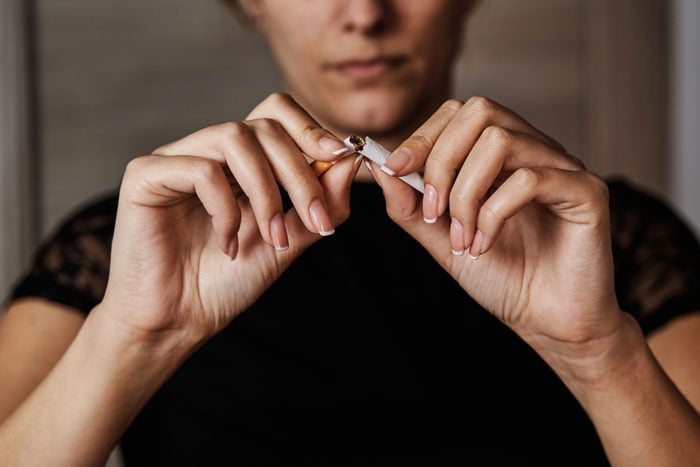
Quit smoking already
One of the best things you can do to reduce your risk of colorectal cancer and to improve your overall health is to quit smoking and using tobacco in any form, says Dr. May. Smoking increases your risk of colorectal cancer—and this adverse effect appears to be more long-lasting in women. Researchers have shown that women who have quit for up to 10 years still have a raised risk of colorectal cancer from smoking—while the impact has disappeared in male ex-smokers.
Remember that it’s important to mention your smoking history to your doctor when appropriate screening is being considered—and if you smoke, the sooner you give it up, the better.

Make a cup of coffee
You can feel good about that morning cup of joe. A 2016 study of 9,200 adults found that drinking coffee could cut risk of colorectal cancer by 26%, which the researchers attributed in part to the fact that coffee “contains several bioactive compounds relevant to colon physiology.”
The protective factor was seen not only with filtered drip coffee, but also with decaf and espresso. Bottoms up!
Putting This in Your Coffee Could Reduce Inflammation, Says New Study
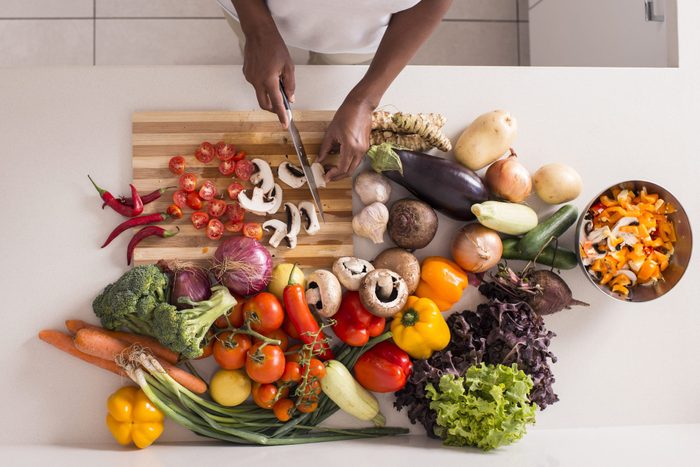
Load up on vegetables
If you’re invested in preventing cancer, you might not be surprised to hear you should increase your veggie intake. When we digest cruciferous vegetables such as broccoli and kale, our bodies produce a substance called indole-3-carbinol (I3C) that could stop cancer in its tracks. I3C activates a protein that protects the body from inflammation in the gut, and a 2018 study showed mice that ate an I3C-heavy diet had fewer and more benign tumors.
A separate study in 2018 suggested that glucosinolates, the compound that gives cruciferous vegetables their bitter flavor (like cabbage, as noted above), also could offer protection against cancer cells.

Keep your weight in check
Obesity and being overweight are associated with an increased risk of not just colorectal cancer but early-onset colorectal cancer, which has an even higher mortality rate, according to a 2021 study published in JAMA Oncology. The association was even higher for women. A separate study of almost 3,000 over-40-year-olds found that those with a body mass index over 25 had a greater chance of presenting with a colon polyp. The polyps themselves aren’t usually harmful, but they can eventually develop into cancer.
“Your lifestyle, including maintaining a healthy BMI, is very important when it comes to reducing your risk for these and other cancers,” says Dr. May. If you are overweight or obese, even losing just 10% of your bodyweight can lower your risk. Lose weight and cut your cancer risk by eating a healthy diet and getting plenty of exercise.
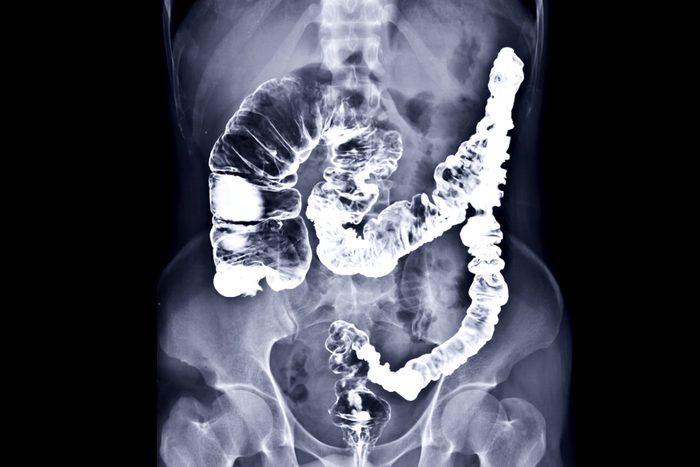
Get regular screenings
Early and regular screening is the key to avoiding colon cancer, or—if you do get it—treating it. Colorectal cancers caught in the early stages, when the cancer is still localized, have over a 90% survival rate while those that aren’t diagnosed until the later stages, when the cancer has spread to other parts of the body, have a survival rate of just 13%, making screening a life-or-death choice, says Dr. May.
The American Cancer Society recommends that, on average, people should get their first screening at age 45. “However,” says Dr. May, “if you have a family history of colorectal cancer you should start screenings at age 40 or ten years earlier than the youngest age one of your near relatives was diagnosed.” So, if your father was diagnosed with colorectal cancer at age 42, then this guideline suggests you should start being screened at age 32.
In addition, if you show any symptoms of colorectal cancer, you should get screened right away regardless of your age.
To help you know when to get screened, Fight Colorectal Cancer has developed an online screening quiz.

Cut back on the booze
Heavy drinking is one of the main risk factors for colon cancer—one study showed that having more than four standard drinks a day increased risk by 21%—but drinking any amount of alcohol can still increase your risk.
Experts now recommend to avoid alcohol, but if you do drink, limit it to no more than two drinks a day for men and one drink per day for women. Why? There are probably several factors at play, but there’s evidence that bacteria in the gut turn alcohol into the carcinogen acetaldehyde. Don’t miss these other science-backed ways to cut your risk of cancer.
For daily cancer-fighting tips, get The Healthy @Reader’s Digest newsletter and follow The Healthy on Facebook, Instagram, and Twitter. Keep reading:
- This Type of Exercise Can Reduce the Risk of Cancer Spreading, Research States
- 11 Things Your Bowel Movements Can Reveal About Your Health
- Putting This in Your Coffee Could Reduce Inflammation, Says New Study
- This Zero-Calorie Sweetener Was Just Linked to Heart Attack and Stroke
Additional writing and reporting by Charlotte Hilton Andersen.